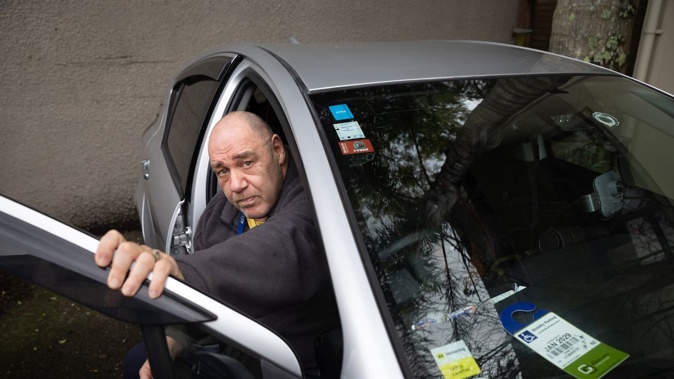

Derek Cossey has “old rugby player knees”, which significantly limit his mobility.
A small relief for the 67-year-old Onehunga man is his parking permit which, when displayed in his vehicle, allows him to park in dedicated mobility spaces, or for double the time shown on time-restricted car parks in Auckland’s on-street parking areas.
But recently, he has received two infringement notices from Auckland Transport (AT) because its new automatic number plate recognition technology, used for parking enforcement, does not recognise mobility permits.
And he is not alone.
 Derek Cossey has had one of his fines overturned, but has not received a response from Auckland Transport about a second one. Photo / Sylvie Whinray
Derek Cossey has had one of his fines overturned, but has not received a response from Auckland Transport about a second one. Photo / Sylvie Whinray
It is a “big issue” and one that “greatly concerns” CCS Disability Action, the primary provider of about 180,000 permits.
BJ Clark, of CCS Disability Action, said other councils were also using the technology, and he had been contacted by up to 30 permit holders nationwide who had been incorrectly fined.
Clark said CCS was not consulted before AT launched the technology, and the service was “desperately” trying to find a solution for its permit holders.
AT has recognised it is an issue and says it is also trying to find a solution.
‘A law unto themselves’
For Cossey, the situation has been extremely frustrating.
Last year, he received a fine by post for exceeding the displayed time restriction in an on-street car park.
However, his permit allowed him double the displayed time, and he had moved on before that time was up.
He managed to have the fine overturned, but said it was not easy.
“It must have taken me four or six emails backwards and forwards to get them to quash the ticket.
“On top of that, it was like they were reprimanding me and saying ‘We’ll do that in this instance...’”
Then he got another ticket in the same circumstances more recently.
He has yet to have it overturned.
Emails, seen by NZME, to Auckland Transport about the ticket have gone unanswered, and the matter has been referred to debt collection agency Baycorp.
 CCS Disability Action issues about 180,000 mobility parking permits nationwide. Photo / Sylvie Whinray
CCS Disability Action issues about 180,000 mobility parking permits nationwide. Photo / Sylvie Whinray
Cossey has had to explain the situation to Baycorp and hopes to get that issue resolved.
“I’ve had to go through the wringer.”
He is concerned about AT’s lack of communication in his case, saying he has asked what it is doing to resolve the parking permit issue, but has not received a response.
“They never come back and say, ‘Look, we’re really sorry that this has happened. We didn’t think about it in the first place, but we’re trying to find a way around it.’ None of that.”
“It’s just ignorance. They’re a law unto themselves. It’s so frustrating to deal with them.”
‘It is a big issue’
Clark said AT had launched the technology without consultation with CCS Disability Action.
“The first thing we knew about it was when this problem started.
“It is a big issue and one that concerns us greatly.
“I’m intrigued by how the council gets away with issuing a ticket to a person who is legitimately parked. It seems to me a little bit strange.”
The service has since met AT, but Clark said an agreeable solution had not yet been found.
AT’s solution of registering number plates against a permit was less than ideal, he said.
 Parking services group manager John Strawbridge said Auckland Transport was working on a solution to the mobility parking problem. Photo / Chris Gorman, NZME
Parking services group manager John Strawbridge said Auckland Transport was working on a solution to the mobility parking problem. Photo / Chris Gorman, NZME
“That sounds like a good way to solve the issue but, from our point of view, it’s not.
“We issue a permit to a person, not a vehicle number plate, and we don’t want people to be able to have more than one vehicle being permitted to use that one permit.
“It opens up the system to abuse.”
Clark said registering vehicles could also pose a problem for older permit holders who might not remember to use the right vehicles if they had multiple registered vehicles.
And permit holders visiting Auckland might not be recognised.
“It restricts the ability for people to use the permit in the way that we give it out,” Clark said.
“That is, it shouldn’t be controlled to one vehicle. It should be controlled to wherever that person is.”
The service has made other suggestions to AT, such as rolling out permits that a mounted device on the council’s vehicles could scan.
But Clark said that method would need to be developed, and there were questions about who would bear the costs.
“We are desperately trying to find a solution.”
‘We know this isn’t a great experience’
AT, which launched the technology in 2019, has recognised it is a “complicated situation”.
John Strawbridge, its group manager of parking services, said: “Our preference is to manage mobility spaces by a parking officer, on foot, so that they can sight whether a vehicle has a current mobility permit displayed. Sometimes the permits are hard to spot.
“However, our camera cars also issue fines to vehicles parked in a mobility spot, with or without a permit, as we do not have access to digital data on active permits.”
The issue was that the permit was for a person, not a vehicle, and the person could ride in multiple vehicles.
“We know this isn’t a great experience for mobility permit holders, and we encourage anyone who has received a fine in error to contact us to see if it warrants being waived.”
Strawbridge said AT was working on a solution that would allow Auckland permit holders to apply for a digital permit through AT’s Park app.
The e-permit would enable people to add all vehicles they intended to use to the AT Park app and switch between them.
AT has also sought access to the CCS database to confirm active permits.
“Our proposed solution will address many of the challenges experienced by permit holders and, when it’s ready to be rolled out, we will be reaching out to them to provide more information. There may be some more improvements needed, and we are committed to making continuous improvements.”
AT confirmed the first of Cossey’s fines was waived, but maintained it had not received any correspondence from him on the second.
However, after “a bit more digging”, it found his emails. It said it would review the matter and respond directly to Cossey.
Tara Shaskey joined NZME in 2022 and is currently an assistant editor and reporter for the Open Justice team. She has been a reporter since 2014 and previously worked at Stuff covering crime and justice, arts and entertainment, and Māori issues.

Take your Radio, Podcasts and Music with you









